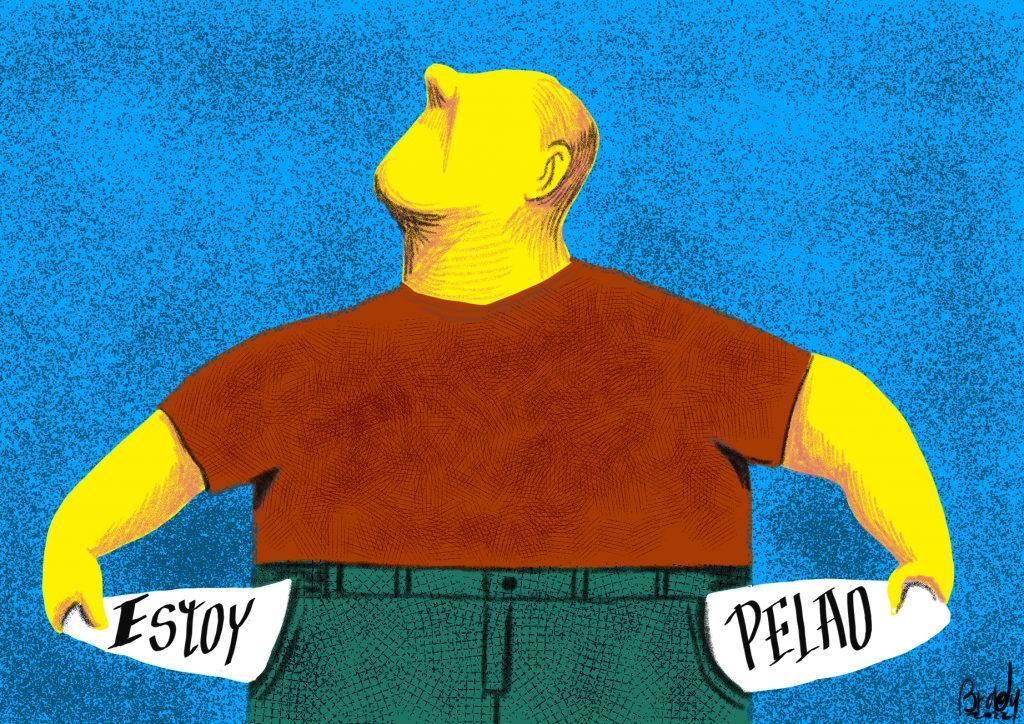I have insisted on several occasions on the wonderful character of the transformations that a word can undergo from very specific circumstances of the social and cultural context, the dynamics of contact between groups that tend to the conservation and standardization of certain linguistic uses, compared to others. that creatively subvert those norms and standardized behaviors of “good saying”.
More than the words, then, what tends to be stretched and amplified in this struggle are their semantic horizons, to the point that some of the new meanings can deviate considerably from the original. This is the case, for example, of the derivations that the family of hair-peel-peel. The old Latin “pilus” (hair) and the corresponding verb form “pilare” (pull out the hair) are still preserved without the historical modification of the verb “depilar” or the word “capilar”.
Little by little “peeling” was enriched to mean, in addition to removing or cutting the hair, removing the skin of animals or the peel of fruits and logs. The participle form: “peeled”, usually expresses, then, that something lacks what naturally covers, surrounds or adorns it. Some of our uses of “peel” and “peeled” stay close to those meanings. However, others take new and imaginative routes.
In that family we can place words derived from “hair” that have acquired a particular nuance among us. Two of them express the notion of abundant hair, either on the head or in other areas of the body: “pelambrera” and “pelera”. Both have a certain pejorative meaning (“why don’t you take off that jacket?”), although not to the degree of the word “pelandruja”, referring derogatorily to a woman who orbits around a committed man (“you were surely out there with any pelandruja”, “you go with the first pelandruja that stands in front of you”, etc.). “Pelón” is both one who lacks or has lost his hair (“So-and-so has gone bald”) as a superlative of good hair (“tremendous black hair he has”), and “La Pelona” is death, which hides its baldness under a black cloak.
Many of our phrases have been organized around the idea of hair. If someone suffers a beating or simply receives a severe scolding, it is said that “they peeled the bun”; if an objective is achieved ultimately or with great sacrifice, it is said that it was “by the hair” (“he passed the exam by the hair”, “he was saved from the accident by the hair”, and also by “a hair”, or by “a tad”), although the formula works equally well for an issue or topic that is forced into the conversation (“he brought up the subject by the hair”). You can also ride a horse “bareback” or “hairless” (without a saddle), a formula that has been extended to mean the undertaking of a company without any recourse (“we went to the beach bareback” – without food, without drinks, no money-). More Cubanized than “al pelo” we also hear “al pellet” out there, with this same purpose and other uses that express, in general, notions such as the purity of an element (“we lower the rum to the pellet” –without mixing- ) or random circumstances (“let’s go to the furry pa’ there”). Very well known are the phrases “when the frog grows hair” (to refer to something improbable or whose resolution will take time) and to say of someone or something that it is “hard to peel”. Referring to the situation (“this is hard to beat”), it usually indicates roughness, difficulty, discomfort: “doing such a long trip in this seat is hard to beat”. Said as a person, it is a mark of intransigence, stubbornness, determination…
In the uses of “pelado” it is a rule, practically in any communicative situation, the use of shortened forms: pelao, pelá. This loss of sounds, as we have already seen in many other cases, leads to the semiotic intensification of what is meant. We hardly hear them say that they were calling someone “loudly”. That cry, hard and energetic, is “pelao”. This meaning of the word, which can be replaced indistinctly by “clean”, tends to mark notions such as doing something using a single means or that which is devoid of protection (“he caught the ball/the pot by hand, pelá”). It also lacks protective coverage and a “pelao cable” represents a danger.
Other uses of “pelao/a” are developed around the idea of wear, burn or scorching of the skin: “I fell off the bicycle and I got a tremendous pelao”. They can also peel the union of the buttocks or thighs due to too much friction: “I have walked so much that I am overwhelmed”. It can also be “peeling” (intense) cold, one of those that leave the lips “pelaos”. And a little more distant, although related, is the notion of what happens burning or destroying because of its speed: “that motorcycle is going to peel”, “this boy runs like hell when there is ice cream”.
There is no lack in our variant of Spanish those uses that have a marked sexual connotation and that have ended up in famous refrains such as “A María likes the pineapple pelá”. One of the most common is the reference to unprotected sexual relations (“put her pelá”), as well as marking that a very intense intercourse has been had whose marks are visible on the genitals (“he left her pelá”, “he peeled me” ). Curiously, the phrase “you have it for me”, developed a use that distances itself to a certain extent from sexual or corporal reference. “You’ve got it for me” (and without the right to a wig, some add) is a sign of being fed up, of tiredness: “don’t talk about it anymore, you’ve got it for me”. I remember that, at least in Pinar del Río, a variant of that formula was used in my adolescence: “I peel it.” Seeing it from a distance, I think it communicates a more permanent and invariable character to nonconformity, which can be with an issue, topic or person: “that song blows me away”, “So-and-so blows me away with his stories”.
Last but not least, we have the significant area of “peeling” related to lack, to loss. A very common way of referring to the circumstance in which all the money has been lost or spent is “I was left bare”. If it is someone else who spent ours, then “they left me bare” or “they peeled me”, both phrases that can work in case of robbery or beating. Staying “pelao” does not only imply losing money, but can refer to goods in general: “they robbed me in the house and left me pelao”. Referring to a place, the idea of ”pelao” implies either the absence of people, or the absence of things: “we went to the concert, but that was bare”, “we passed by the farm and it was bare”. If you want to magnify that emptiness or absence, the derivative, very much ours, of “peladera” is used: “let’s go, here what there is is tremendous peladera” (that is, nothingness abounds).
The closure of this drift was provided by my son a few days ago. When I asked him if he wanted a little egg to accompany the rice, he told me: “No, daddy. Give me pelao rice”.






